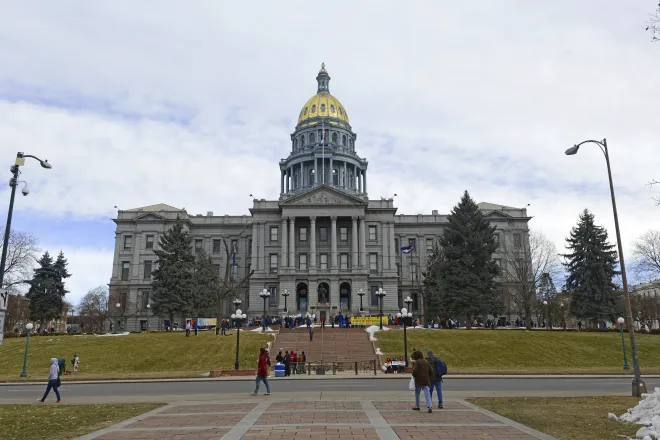
Daily Audio Newscast Afternoon Update - July 25, 2025
© INDU BACHKHETI - iStock-1336427297
News from around the nation.
Texas plan to redraw maps could protect GOP House majority; NYers protest federal budget bill's cuts, policy changes; Ohio Freedom Schools mobilize youth to speak out for public education; MSU studies fire-resistant structures, amid house fires uptick.
Transcript
The Public News Service Friday afternoon update, I'm Mike Clifford.
Worried they could face a difficult 2026, Republicans are taking steps now to shore up their House majority, even if voters turn against them.
That from the Washington Post.
They report party leaders are redrawing congressional districts in Ohio and starting this week Texas to strengthen their narrow majority, blunting the possibility that Democrats can win the seats they need to take control of the House.
The Post notes the most immediate battle unfolding in Texas, where Governor Greg Abbott called a 30-day special session to provide flood relief, and at the urging of President Trump, established new maps that could give Republicans five more seats.
Meantime, New Yorkers statewide are planning families' first protest this weekend.
It's another national response to the numerous cutbacks, layoffs, and federal policy changes that mark the first six months of the latest Trump administration.
One focus will be on the impending impacts of the federal budget mega-bill.
Families are determining how to handle the expected cuts to safety net programs like Medicaid and SNAP.
Michael Chamitas is on the Columbia County Board of Supervisors where he predicts farming communities will face additional impacts.
So for farm communities, a huge portion of our county is farmland, but the bill really moves money to giant agribusinesses rather than supporting small farmers.
It really prioritizes giant corporations over small businesses.
Some farmers worry how the budget mega bill will affect negotiations for a long-awaited farm bill in Congress.
The new budget isn't all bad news for farmers since it raises what are known as reference prices for commodity crops and provides a better safety net if they fall below a certain minimum.
I'm Edwin J. Vieira.
And more than 250 students from across Ohio gathered at the Statehouse this week for a National Day of Social Action.
Jake Streeter, who heads the Cleveland Freedom Schools of Ohio, says his young scholars are encouraged to speak up about issues affecting their lives and education funding is at the top of the list.
He says the goal isn't just to be heard, it's to inspire others to speak up and take action.
They will present their arguments and their perspectives, as well as their solutions, which will also be broadcasted live, not just so their voices can be heard, but so that other youth can be inspired to make sure that their voices are heard on this topic, as well as other topics that are to come.
Organized by the Children's Defense Fund, he says the Freedom Schools program blends reading, cultural identity, and civic leadership.
This year's theme for the National Day of Social Action is "Public Education is a Public Good."
Farah Siddiqui reporting.
Next is "How's Farah's Rise Nationwide?"
Researchers at Michigan State University are working to make buildings more fire resistant.
Venkatesh Khodur, who leads MSU's First in the Nation Center on Designing Fire-Resistant Structures says modern homes are at greater risk than homes built in the 70s and 80s.
In fact, we did a project with the Underwriter Laboratories to show this.
Even the structural materials we use in modern houses are much more vulnerable.
In 2023, over 120 Michiganders died in more than 100 house fires. and 11 percent more fires than the state's five-year average.
And every day, there are more than 900 house fires across the country.
This is public news service.
Healthcare workers in Massachusetts will join the National Day of Action tomorrow, calling for an end to federal policies they say harm children and families.
Hundreds of thousands of residents are expected to lose their Medicaid and SNAP benefits following cuts to social safety net programs in the recently passed federal spending bill.
Marlicia Aho with 1199 SIU United Healthcare Workers East says the state is bracing for nursing home closures, job losses and fewer available services.
We need to invest in healthcare, not cut.
And so we are really incredibly worried about what this means to care in Massachusetts for everyone.
Backers of the federal budget say spending cuts were needed to ensure an extension of the 2017 tax cuts.
Aho says last year's financial collapse of Stewart Healthcare already put the state in in a fragile position.
Rallies are planned tomorrow in Boston, Worcester, Pittsfield, and several other locations.
I'm Catherine Carley.
State officials say total cuts to Massachusetts federal healthcare funding could top more than $3 billion annually and will have significant ripple effects.
Roughly 58,000 Wyomingites and 63 million Americans provide ongoing care to adults or kids with medical conditions or disabilities.
A new report says that is a 45 percent increase since the year 2015.
The new AARP report shows the average caregiver spends 27 hours per week on caregiving tasks.
AARP's CEO, Myesha Minter-Jordan, notes that caregiving can impact a person's finances as well as their physical and mental health.
We need systems that see caregivers, value them, and support them because they are not just helping families.
They are holding up our entire healthcare system.
Mentor Jordan says AARP is advocating for a national paid family medical leave policy, workplace protections for caregivers, federal tax credits and access to respite care, training and support services.
I'm Kathleen Shannon.
And Minnesota's smaller school districts are preparing for another year of doing more with less.
Joel Gould teaches social studies in Cass Lake, and this week he's in Washington, D.C. for conferences led by the American Federation of Teachers.
He's also sharing his views about budget constraints with the state's congressional delegation.
His district only has about a thousand students and gets most of its funding from the state and local property taxes.
But federal funding helps cover needs like special education and Gold says that has been inadequate.
For a long time now, the federal government has not been living up to its promise for fully funding special education in our schools.
As needs grow, smaller districts have a hard time maintaining special ed staff because larger districts offer higher pay.















